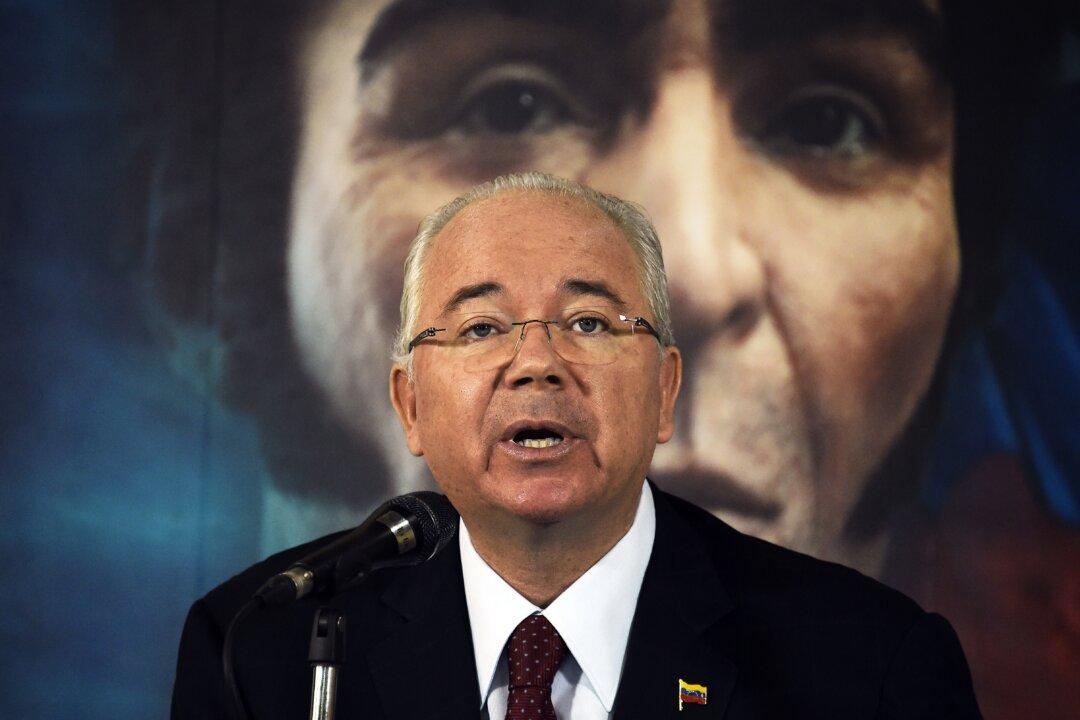UNITED NATIONS—Venezuela’s ambassador to the United Nations dismissed the possibility of cooperating with U.S. investigations into a billion-dollar bribery schemes that allegedly occurred at the country’s state-run oil company while he was in charge.
The allegations surrounding corruption at the PDVSA oil company cast a pall over Ambassador Rafael Ramirez as Venezuela took over the rotating presidency of the Security Council on Monday.
It was a long-held dream of the late Venezuelan President Hugo Chavez to win a seat at the Security Council, a high-profile platform to showcase his defiance of a U.S.-led world order. Venezuela finally achieved that goal in 2014 under President Nicolas Maduro, more than a year after Chavez died of cancer.
[aolvideo src=“http://pshared.5min.com/Scripts/PlayerSeed.js?sid=1759&width=580&height=356&playList=519445711&responsive=false&pgType=console&pgTypeId=discovery-videoDetails-grabCodeBtn”]
Venezuela will hold the Security Council presidency for the month of February, getting the chance to influence the agenda of the most powerful U.N. body. Ramirez said he plans a Security Council debate on Feb. 15 on one of Chavez’s favorite themes: defending the national sovereignty of countries against what he saw as U.S. meddling in domestic affairs.
Ramirez cited the U.S.-led military operations in Syria. He differentiated that from Russia’s bombing campaign in Syria, which has the approval of the government of President Bashar Assad. Venezuela has often taken Russia’s side in Security Council disagreements over how to address the Syrian civil war.
“While we don’t have troops and will never have troops abroad, we are going to raise our voice,” he said. “Some countries on the Security Council decide on their own which governments are legitimate and which are not.”
[morearticles]1949641, 1894205[/morearticles]
Ramirez said he was not concerned about the possibility of being indicted as part of U.S. investigations into corruption at PDVSA, which have led to the recent arrests of two Venezuelan businessmen who allegedly paid more than $1 billion in bribes to secure contracts with the company. Last year, the U.S. Treasury Department accused a bank in Andorra of laundering some $2 billion stolen from PDVSA.
Ramirez was the president of PDVSA for a decade until 2014. He said he did not know the two businessmen, Abraham Jose Shiera Bastidas and Roberto Rincon, who were arrested in December on charges detailed in an indictment filed in federal court in Houston. Asked if he had been contacted by U.S. authorities seeking his cooperation, Ramirez shook his head and asked rhetorically, “Do you think I am going to accept the jurisdiction of another country on national matters?”
He added: “I don’t think they would show me that lack of respect.”
[morearticles]1948327, 1921100[/morearticles]
The ambassador was terse while discussing allegations of corruption at PDVSA but he dismissed the U.S. investigations as an attempt to undermine Maduro’s government, which has had tense relations with Washington.
“There has always been interference in our affairs,” Ramirez said. “We are used to it. We understand that all of this is a political confrontation and we accept that. If we took it personally, we would just make our lives miserable.”
Venezuela takes over the Security Council presidency as its economy teeters on the brink of collapse, reeling from a plunge oil prices, a severe shortage of dollars and inflation running into the triple digits.
Last month, Secretary-General Ban Ki-moon announced that Venezuela was one of 15 countries in arrears in paying its annual contribution to the U.N. regular budget, resulting in a temporary loss of its voting rights at the General Assembly.
The U.N. said Venezuela paid its debt last week. Ramirez denied that the delay had anything to do with Venezuela’s economic difficulties, calling it an “administrative matter.”





